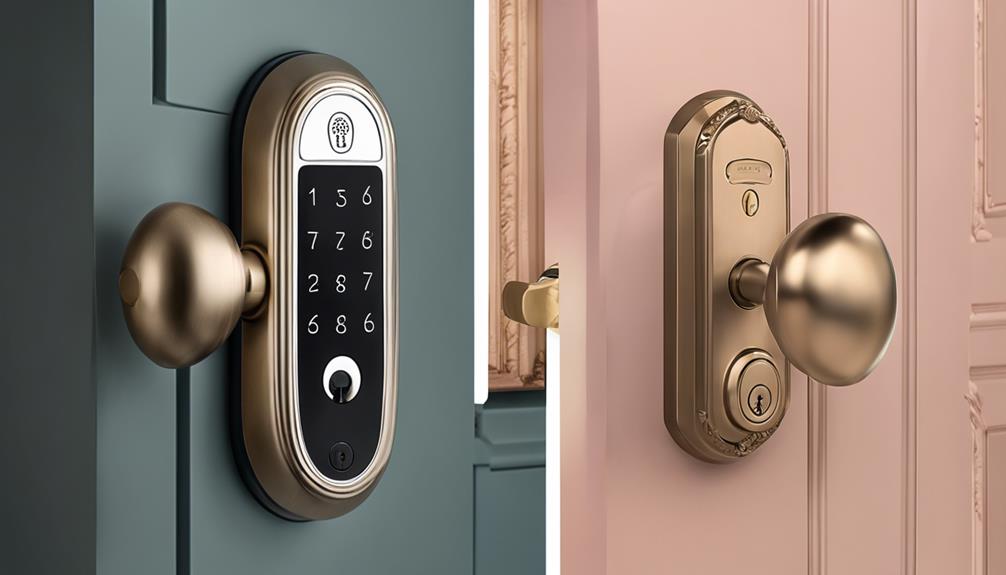When you compare smart locks to traditional locks, you'll find distinct user experiences. Smart locks offer the convenience of keyless entry and remote control, making it easier to manage your home access from anywhere. They come with innovative features like temporary codes and access logs. However, traditional locks rely on tried-and-true mechanical systems, providing durability and simplicity without the worry of hacking. Many people appreciate the emotional security that familiar physical keys bring. Both options have their strengths, but you'll discover even more details about their unique benefits and potential drawbacks as you explore further.
Key Takeaways
- Smart locks offer remote access control and keyless entry, enhancing convenience compared to traditional locks requiring physical keys.
- Traditional locks are familiar and reliable, often perceived as more secure due to their mechanical simplicity and durability.
- Smart locks provide features like access logs and temporary codes, improving user experience for managing home access.
- Traditional locks have lower installation and maintenance costs, making them a cost-effective choice for multiple entry points.
- Smart locks face vulnerabilities like hacking risks, while traditional locks are less susceptible to such threats, providing peace of mind for users.
Overview of Smart Locks
When you think about home security, smart locks mightn't be the first thing that comes to mind, but they're rapidly changing the way we protect our spaces. With their innovative technology, smart locks offer an enhanced user experience that traditional locks simply can't match.
Imagine being able to control access to your home remotely, ensuring your loved ones are safe while offering convenience to guests. Unlike traditional locks, which rely on physical keys, smart locks provide convenience and control features that allow you to manage access from anywhere.
The smart lock interface is designed for ease of use, making it accessible for everyone, regardless of their tech-savviness. You can open your door with a simple tap on your smartphone or through voice commands, eliminating the need for physical keys.
This not only streamlines your daily routine but also empowers you to manage who enters your home at any time.
While traditional lock simplicity has its charm, smart locks bring a level of security and flexibility that's hard to ignore. You can set temporary access codes for visitors, receive notifications when someone enters, and even lock your doors from anywhere.
Overview of Traditional Locks
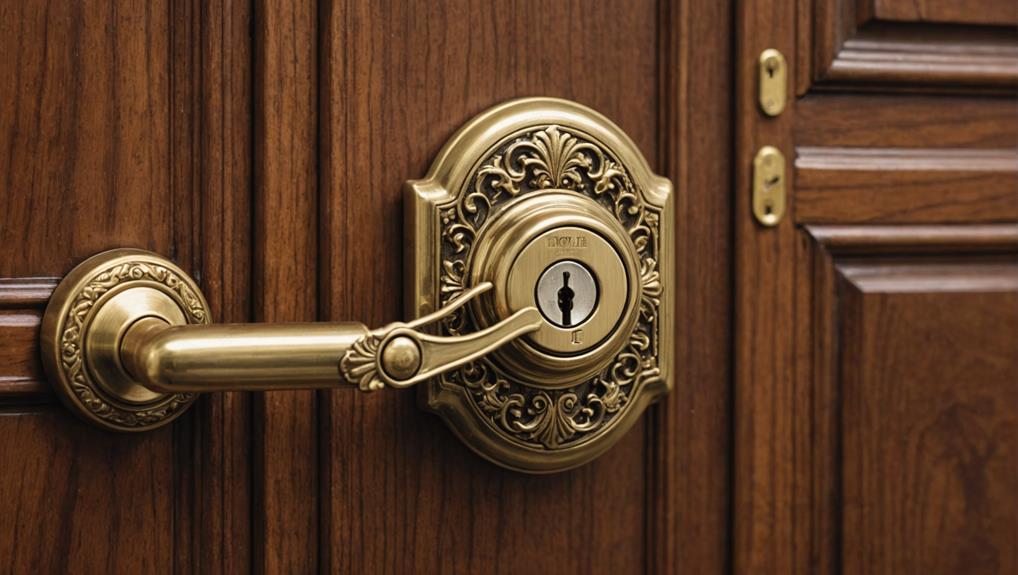
Traditional locks operate using mechanical components, which you can easily understand with a bit of insight into their design. They typically include features like deadbolts and latch mechanisms, which can enhance security when properly installed.
Their security features, while effective, can vary widely, impacting how safe you feel at home. For instance, choosing a lock based on your security needs can make a significant difference in your overall home protection strategy.
Plus, the installation and maintenance process is straightforward, but it requires some attention to guarantee they function properly over time.
Mechanism of Operation
Locks operate through a straightforward mechanism that relies on physical components to secure doors and provide access. When you insert a key, it aligns pins inside the lock to allow the cylinder to turn, granting entry. This traditional lock user experience emphasizes simplicity and reliability.
Here's a quick comparison of key components that contribute to their usability:
| Component | Function |
|---|---|
| Cylinder | Houses the pins and turns to release |
| Pins | Align with the key to allow cylinder movement |
| Key | Unique shape that manipulates the pins |
| Housing | Protects the internal mechanics |
| Bolt | Engages with the door frame to secure it |
Understanding these components helps you appreciate traditional locks' smart lock reliability. While smart locks offer advanced features, the usability of traditional locks remains appealing for many. They provide a tactile experience that some still prefer, especially when serving others who may not be tech-savvy. Ultimately, knowing how these locks operate can enhance your confidence in their everyday use, ensuring you can assist others effectively.
Security Features Overview
Examining the security features of traditional locks reveals their time-tested effectiveness in safeguarding homes and businesses.
When you consider smart vs traditional locks, it's important to appreciate the reliable attributes that traditional locks offer. Here are some key security features that stand out:
- Robust Materials: Most traditional locks are made from durable metals that resist tampering and break-ins.
- Simplicity in Design: Their straightforward mechanism makes them less susceptible to hacking or technical failures.
- Widely Recognized: Familiarity with traditional locks means you and your visitors can easily operate them, enhancing the ease of use.
- Cost-Effectiveness: Traditional locks generally come at a lower price point, allowing you to secure multiple entry points without breaking your budget.
While smart locks may offer advanced features, you can't overlook the peace of mind that comes with the reliability of traditional locks.
They've stood the test of time, providing a sense of security you can trust. As you weigh your options, consider how these dependable features can serve you and those you care for, ensuring safety in every situation.
Installation and Maintenance
When it comes to installation and maintenance, traditional locks offer a straightforward approach that many homeowners appreciate. You'll find that most traditional locks can be installed with just a few basic tools, making it accessible for the average DIY enthusiast. Additionally, their maintenance is often minimal, requiring only periodic lubrication and inspection.
Here's a quick comparison of the installation and maintenance of traditional locks:
| Aspect | Traditional Locks |
|---|---|
| Installation Ease | Simple, minimal tools |
| Maintenance Needs | Low, occasional upkeep |
| Cost of Repair | Generally low |
| Lifespan | 10-20 years with care |
You'll notice that with traditional locks, you're not only saving on installation costs but also on the long-term upkeep. This simplicity allows you to focus on what truly matters—serving your family and ensuring their safety. By choosing traditional locks, you embrace a reliable, easy-to-manage security solution that has stood the test of time.
Ease of Use Comparison
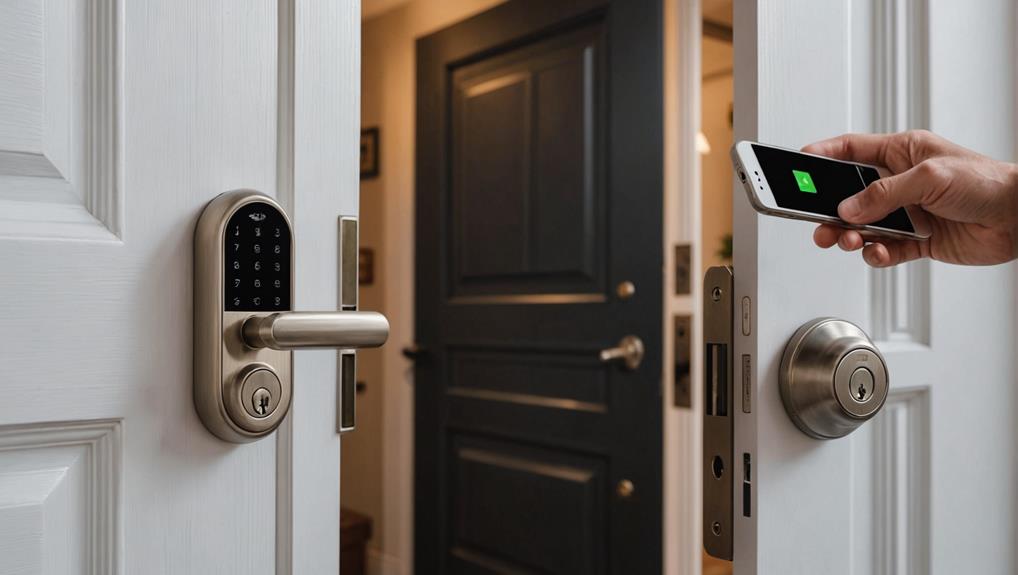
When comparing ease of use, smart locks offer keyless entry that can simplify your routine, letting you open your door with just a tap on your smartphone.
Additionally, many smart locks provide features such as remote access and temporary codes for guests, enhancing convenience even further the benefits of hybrid systems.
You'll also enjoy the convenience of smartphone integration, allowing you to manage access from anywhere.
On the other hand, traditional locks rely on a physical mechanism that might feel more familiar but can be less convenient in a fast-paced world.
Keyless Entry Convenience
While both smart locks and traditional locks serve the same fundamental purpose of securing your home, the keyless entry convenience of smart locks stands out significantly.
Imagine never fumbling for keys again, especially when your hands are full or the weather's uncooperative.
Here's what makes keyless entry a game-changer:
- Easy Access: You can open your door with a simple code or a fingerprint, eliminating the hassle of searching for keys.
- Guest Access: You can grant temporary access codes to friends or family, so they can help themselves when you're not home.
- Lock History: Many smart locks keep a log of who accessed your home and when, providing peace of mind.
- Remote Control: You can open your door from anywhere, ensuring you're always in control, even when you're away.
This convenience not only enhances your daily routine but also allows you to welcome guests effortlessly.
With smart locks, you can focus on serving others without the distraction of traditional key management.
Embrace the ease that comes with keyless entry and elevate your home security experience.
Smartphone Integration Benefits
Smart locks offer impressive smartphone integration benefits that greatly enhance ease of use. Imagine being able to control your home's entry points right from your pocket. With just a few taps on your smartphone, you can lock or open your door, check on entry logs, and even grant temporary access to guests without needing to be there.
This convenience is particularly beneficial when you're hosting friends or family, allowing you to serve them effortlessly.
Moreover, many smart locks integrate seamlessly with smart home systems, enabling you to include door access in your broader home automation. You can set routines that automatically lock the doors at night or sync them with your security cameras for added peace of mind.
Notifications alert you when someone enters or leaves, keeping you informed without any extra effort. This level of control not only simplifies your life but also enhances security for those you care about.
You can easily share access with family members or trusted friends, ensuring they feel welcome while maintaining your home's safety. With smartphone integration, managing access to your home has never been easier, allowing you to serve others while staying connected.
Physical Lock Mechanism
The ease of use between smart locks and traditional locks often comes down to the physical lock mechanism itself. When you think about how you interact with these locks daily, several factors can impact your experience:
- Installation: Traditional locks often require basic tools, while smart locks may need specific knowledge or apps.
- Accessibility: With traditional locks, a simple key is all you need; smart locks might require a smartphone or code.
- Response Time: Turning a key is immediate, but smart locks may have slight delays while they connect to your device.
- Backup Options: Traditional locks can be accessed with a spare key, while smart locks may have limited backup methods if the battery dies.
If you value simplicity, traditional locks often shine in their straightforward approach.
However, if you're looking to serve others or enhance security with features like remote access, smart locks can offer significant advantages.
Ultimately, your choice should reflect your lifestyle and the needs of those around you.
Reliability of Smart Locks
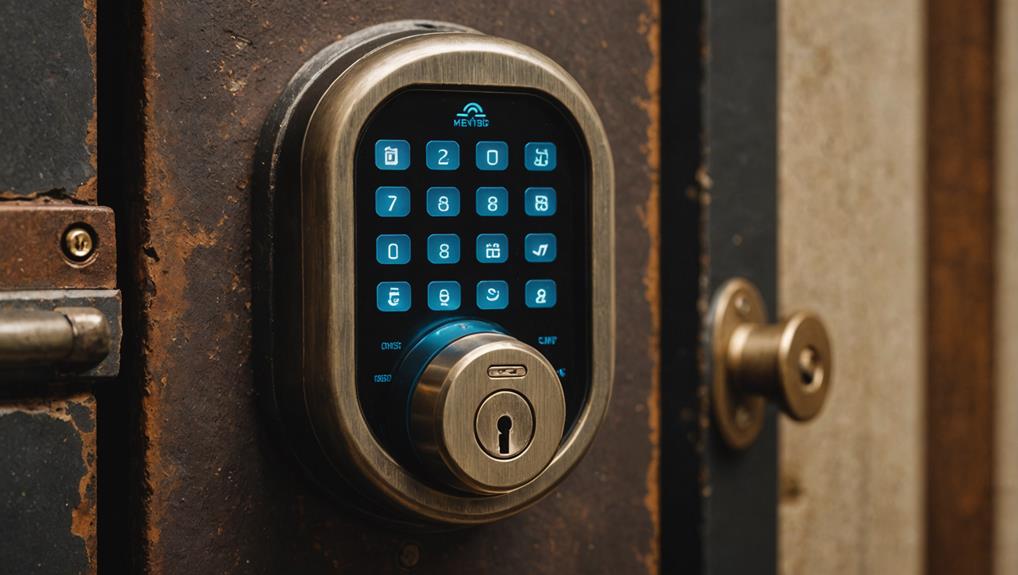
Evaluating the reliability of smart locks reveals a blend of advanced technology and potential vulnerabilities. When you consider incorporating smart locks into your home, you'll want to weigh their benefits against the risks.
Smart locks often boast features like remote access, keyless entry, and integration with home automation systems, making them convenient for you and your guests. Additionally, many smart locks offer enhanced security features, such as automatic locking and alerts when doors are left ajar, which can provide peace of mind for homeowners the pros and cons of smart locks.
However, this technology does come with concerns. One primary worry is the dependence on Wi-Fi or Bluetooth connectivity. If your internet goes down or you lose power, you might find yourself locked out.
Additionally, while manufacturers work hard to secure their devices, smart locks can still be susceptible to hacking. It's crucial to choose reputable brands that prioritize security updates.
You should also consider the durability of smart locks. Many are designed to withstand harsh weather conditions, but some cheaper models mightn't hold up as well over time.
To serve your loved ones best, invest in reliable smart locks that combine security with technological innovation. Ultimately, staying informed and proactive can help you enjoy the benefits of smart locks while minimizing potential risks.
Reliability of Traditional Locks
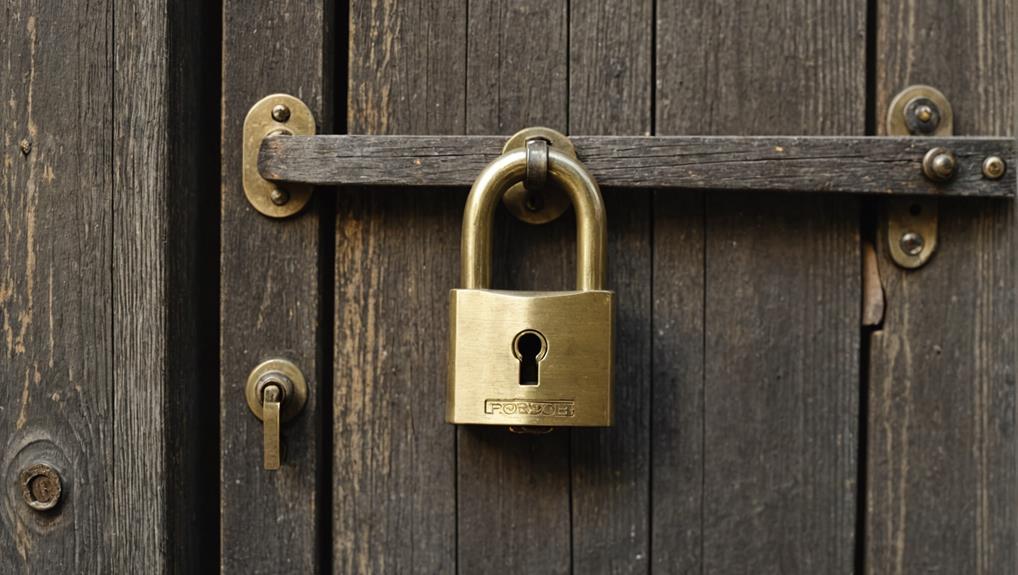
Many homeowners find traditional locks to be a reliable choice for securing their properties. These locks have stood the test of time, providing a sense of security that many appreciate.
When you consider their functionality, several key features come to mind:
- Simplicity: They're easy to operate, requiring just a key to open.
- Durability: Made from sturdy materials, traditional locks can withstand wear and tear.
- Low Maintenance: With minimal upkeep, they often last for years without needing replacement. In fact, their cost-effectiveness often makes them a more budget-friendly option than smart locks.
- Cost-Effective: Typically, they're more affordable upfront compared to smart locks.
In a world where technology can sometimes fail, you may find comfort in the straightforwardness of traditional locks. They don't rely on batteries or Wi-Fi connections, meaning you can count on them to work regardless of power outages or technical glitches.
This reliability makes them an excellent choice for those who value security and simplicity. By opting for traditional locks, you're not just safeguarding your property; you're also embracing a proven method that prioritizes dependability, ensuring peace of mind for you and those you serve.
User Satisfaction Insights
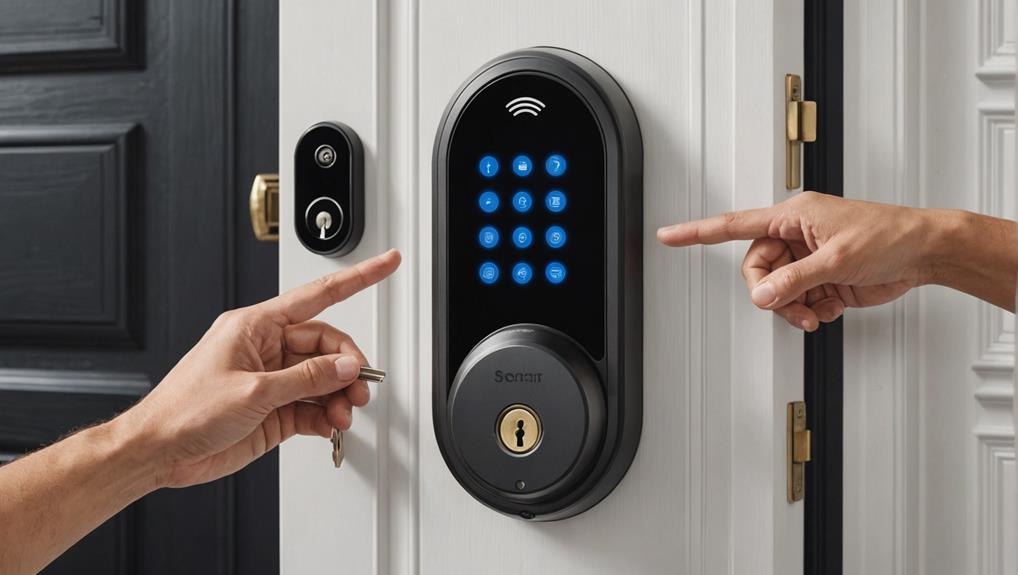
User satisfaction plays a crucial role in choosing between smart locks and traditional locks. When you consider the preferences of those you serve, it's important to evaluate how each option impacts their daily lives.
Smart locks offer convenience, allowing users to open doors with smartphones or key codes. This feature often appeals to tech-savvy individuals who appreciate the ease of access and the ability to manage their locks remotely. However, it's significant to recognize that smart locks can present certain vulnerabilities, such as potential hacking risks, which may concern some users.
In contrast, traditional locks are often viewed as more secure due to their simplicity and proven reliability, making them a preferred choice for those particularly worried about security features.
On the other hand, traditional locks provide a sense of reliability and familiarity. Many individuals feel more secure using a physical key, as it's a time-tested method that doesn't rely on batteries or technology. Understanding the emotional connection people have with traditional locks can guide you in making informed recommendations.
Moreover, user feedback reveals that satisfaction often hinges on ease of installation and maintenance. Smart locks may require occasional updates or troubleshooting, while traditional locks generally need minimal upkeep.
Future of Lock Technology
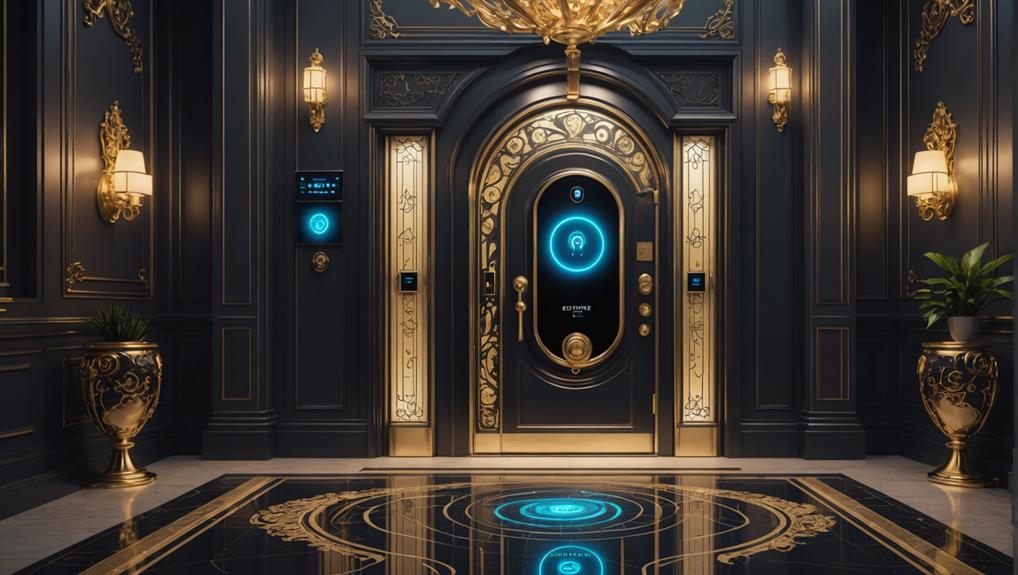
The evolution of lock technology is poised to reshape how we secure our homes and businesses in the coming years. As you consider these advancements, you'll find innovative solutions that not only enhance security but also prioritize user experience and convenience.
For instance, understanding the differences between re-keying and reprogramming can help you make informed decisions about your smart locks. Here are some trends to watch for:
- Biometric Authentication: Using fingerprints or facial recognition for quick access.
- Integration with Smart Home Systems: Seamless connection with other smart devices for enhanced control.
- Remote Access Features: Granting access to trusted individuals from anywhere.
- Artificial Intelligence: Analyzing patterns to predict and prevent security breaches.
These developments aren't just about technology; they're about fostering trust and ensuring peace of mind for you and those you serve.
Imagine being able to welcome guests remotely or receive alerts when someone enters your space. The future of lock technology isn't solely focused on convenience; it's about creating a safer environment for families and communities.
As you explore these advancements, think about how they can enhance your life and the lives of those around you. Embracing these changes means being part of a movement toward smarter, more secure living.
Frequently Asked Questions
Do Smart Locks Require an Internet Connection to Function?
Smart locks don't always need an internet connection to function. Many models work via Bluetooth, allowing you to open your door with your smartphone when you're nearby.
However, if you want remote access or to control the lock from anywhere, an internet connection is necessary.
It's important to choose a smart lock that fits your needs and lifestyle, ensuring you can serve others effectively while maintaining security and convenience.
How Can I Reset a Smart Lock if It Malfunctions?
If your smart lock malfunctions, resetting it usually involves a few simple steps.
First, check the lock's manual for specific instructions. Generally, you'll need to locate the reset button, often found inside the battery compartment.
Press and hold it for a few seconds until you see a light indicator. After that, you can set it up again, ensuring it works properly.
Remember to update the app if needed to maintain functionality.
Are Traditional Locks More Secure Against Hacking Attempts?
Oh sure, because who wouldn't want to pick a lock like it's a fun game?
Traditional locks do offer some advantages, such as being immune to hacking, since they don't rely on Wi-Fi or Bluetooth.
However, they're not invincible—skilled burglars can still break in.
If you're worried about hacking, sticking with a traditional lock might ease your mind, but don't forget to serve your home's security needs wisely!
Can Smart Locks Be Used With Existing Traditional Lock Systems?
Yes, smart locks can often be integrated with existing traditional lock systems.
You'll find models designed to fit over your current deadbolts or work alongside them, allowing for enhanced security without completely replacing your setup.
This flexibility means you can enjoy the convenience of smart technology while maintaining the reliability of your traditional locks.
It's a great way to serve your needs and those of your loved ones without sacrificing security.
What Happens if the Smart Lock's Battery Dies?
If the smart lock's battery dies, you won't be able to open it electronically.
However, most smart locks come with a backup key option, so you can still gain access using a traditional key. It's a good idea to keep a spare key handy, just in case.
You can also monitor the battery level through the app and replace it before it dies, ensuring smooth access for everyone.
Conclusion
In the end, choosing between smart locks and traditional locks really comes down to your lifestyle and preferences. If you love tech and convenience, smart locks might just be your new best friend, like finding the perfect pair of shoes that fit effortlessly. On the other hand, if you appreciate simplicity and reliability, traditional locks could feel like a warm hug from a familiar friend. Whichever you choose, both can secure your space—just like a dependable umbrella on a rainy day.

